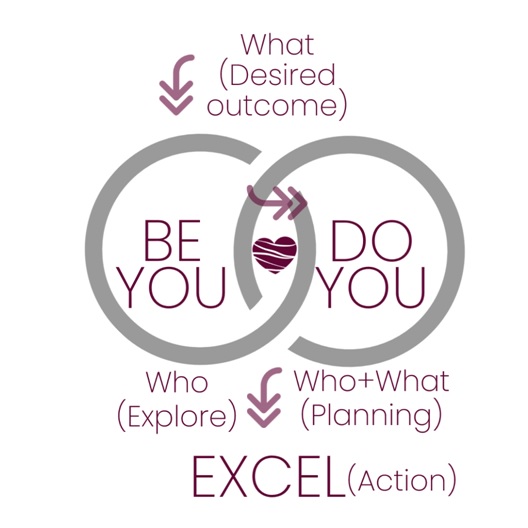A Coaching Model Created by Kombe Temba
(Life Coach, ZAMBIA)
Introduction
The theme of this model is my core values: simplicity and authenticity. Simplicity represents a willingness to live an uncomplicated, mentally and physically decluttered, and spiritually anchored life. Authenticity represents an unapologetic acceptance of self, built by a compassionate drive to know and understand me better.
In the model, showing up simply (being present, with a decluttered mind) and authentically means that the coach can be curious and share observations from a genuine, caring place. This in turn creates an open and safe space for the client to be themselves and share from a vulnerable place.
The coach’s role is to help the client identify and visualize their session goal, or the ‘what’. From there, the coach can support the client to explore and unpack what is standing in the gap between knowing what to do and doing it. This is done by focusing on the ‘who’ of the client. Helping the client see the relationship between the ‘what’ and their ‘who’ creates a platform from which they can launch into planning and action. Carly Anderson sums this up as using the ‘who’ of the client to inform the ‘what’ as they move forward and take action.
A guide to the coaching model

Step 1:
Establishing the ‘what’
This is the point at which the coach and client form a partnership based on the client’s desired outcome. The coach helps the client to get clear on what they want to achieve (what do they want to have, see or feel?) and why. The client also gets to explore what is meaningful about achieving the outcome, which in turn helps the coach to get an insight into the client’s relationship with the issue.
Step 2: BE YOU:
uncovering the ‘who’ of the client
At the core of the model is a heart, which represents stillness and compassion:
- Stillness: We can only listen to our heartbeat when we are still, and the same principle applies when listening for answers from within. So the coach needs to give the client time and space to answer questions.
- Compassion: non-judgemental acceptance by the client of whatever they uncover. This is important as acceptance gives way to connecting with the client’s truth, and it is this truth that can provide clarity as well as checks and balances for the client as they move forward with their goal.
The coach asks themselves questions like the following that seek to discover the client’s relationship with the issue:
Step 3: DO YOU:
Moving forward using the ‘who and what’ to plan
The coach considers the following and invites the client to see how they can use their awareness and learning to move forward with their desired outcome:
Step 4: EXCEL:
Taking action steps towards the desired outcome
This is the stage where the client moves from planning to execution. It is important for this phase not to be a ‘box-ticking’ exercise, but rather a meaningful step in their growth journey. It is about helping the client to move forward with a new or different perspective and to achieve success as defined and measured authentically by them. The coach keeps in mind the following:
Do the best you can until you know better. Then when you know better, do better.– Maya Angelou
As the client moves along their journey the coach can support them by bringing them back to the core of the model. The heart serves as a reminder to take a self-compassionate and non-judgemental approach when the client does not meet their targets or goals as initially planned. The model encourages them to acknowledge what they have accomplished and learned in the process, and then use that to inform the step they choose to take next. This way, the coach continues to support the client to use their ‘who’ to inform the ‘what’ in the client’s journey.
References
Carly, A., 2020. ICF Certification Coach | Carly Anderson, MCC. [online] Carly demonstrates and debriefs a coaching session as a guest speaker on an ICF chapter call.
https://www.goodreads.com/quotes/7273813-do-the-best-you-can-until-you-know-better-then
Katie, B., and Mitchell, S. (2002). Loving what is : how four questions that can change your life. London: Rider.
Meyer, J., 2020. Make Every Day Count. [online] Bible.com.